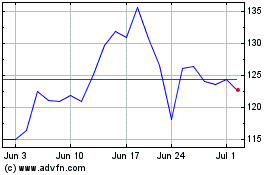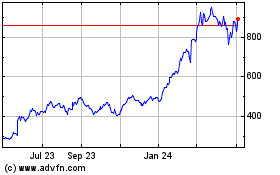By Jessica Menton
Global trade tensions have pummeled shares of highflying
semiconductor companies like Advanced Micro Devices Inc., Micron
Technology Inc. and Nvidia Corp. over the past two months. More
pain may still be to come.
Investors are looking to the Group of 20 summit that starts
Friday for updates on trade talks with China, and any further
pressure on chip stocks could spell more trouble for the broader
market. That is because chip stocks often lead the S&P 500 on
the way up and the way down.
The broad stock-market index and the semiconductor group, which
makes up 3.2% of the index, have moved in the same direction 78% of
the time this year, according to Dow Jones Market Data. Going back
to the beginning of 2016, when chip stocks began their steady
ascent, the percentage is 76%.
The PHLX Semiconductor Index, up 84% since the beginning of
2016, has tumbled 11% from the start of October as shares of chip
companies have been caught in the crosshairs of escalating
China-U.S. trade tensions. Chips are used in several hot areas of
growth: data centers, gaming and artificial intelligence.
Despite a 31% slide since Oct. 1, AMD shares are still the
S&P 500's best-performing stock this year, with a gain of 108%.
Micron shares have tumbled 16% from the beginning of last month,
pushing them into the red for the year with a decline of 7.8%. And
Nvidia shares, which have lost 44% of their value since early
October, have plunged more than 20% in the past two weeks alone in
the wake of a disappointing earnings report.
The PHLX index has underperformed the broader S&P 500, which
has shed 6% since the beginning of last month. The sector, though,
has gotten some relief this week, with the PHLX index rising
3.6%.
More clarity about their path going forward should come after
President Trump's trade talks with Chinese President Xi Jinping in
Buenos Aires later this week. Mr. Trump has said it is "highly
unlikely" that he would hold off on his existing plans for raising
tariffs on $200 billion of Chinese imports, and that if no deal
came from the meeting he would order additional levies on other
Chinese goods. That would likely include Apple Inc. iPhones and
laptop computers, powered by semiconductors.
"Investors want to see whether the tariff bark is worse than the
bite," said Daniel Ives, Wedbush Securities managing director and
equity analyst.
Chip stocks aren't alone. Other tech stocks like the popular
FANG trade of Facebook Inc., Amazon.com Inc., Netflix Inc. and
Google parent Alphabet Inc. have also suffered steep losses in
recent weeks on signs of slowing revenue growth. Investors in all
have pulled $2.2 billion from global technology funds in the month
through Tuesday, according to fund-flow data provider EPFR, after
adding $52.3 billion from August 2016 to August 2018.
Some investors see the recent slide in chip stocks as a chance
to pick up shares cheaply. James Wang, analyst at ARK Invest, said
his firm has been buying Nvidia shares this month.
He points to expectations of strong revenue growth in the coming
years, driven by artificial intelligence and autonomous
driving.
"For us, Nvidia was a very obvious buying opportunity," Mr. Wang
said, adding that excess inventory concerns surrounding the company
are only relevant for the next few quarters. "It's hard to see how
in three to five years this issue would still be relevant by
then."
The company's forward price-to-earnings ratio was 22.8 as of
Monday, down from 42.1 at the start of the year, while the S&P
500's ratio was down to 15.3 from 18.1, according to FactSet.
JJ Kinahan, chief market strategist at TD Ameritrade, cited
recent interest from clients in Nvidia, helped in part by its
cheaper valuation and the holiday shopping season, which is
expected to help boost tech shares as demand increases for
electronics.
Among the top five stocks traded by TD Ameritrade retail clients
on Black Friday were Apple, Amazon.com, AMD, Nvidia and Netlix,
according to Mr. Kinahan.
As chip stocks have faced demand worries, Wedbush's Mr. Ives
said he has noticed more investors rotating out of semiconductor
stocks and into software stocks such as VMware Inc. and Palo Alto
Networks Inc., which have exposure to the cloud or cybersecurity
and have delivered strong earnings.
Another tech giant that has benefited from the move to the
cloud: Microsoft Corp., which briefly eclipsed longtime rival Apple
as the world's most valuable company earlier this week.
"Microsoft isn't sexy, but it's an impressive story," Mr.
Kinahan said, referring to how the company changed its business
model in recent years to pivot toward cloud computing.
"The cloud business continues to heat up," he said. "Microsoft
made a bet there, and that bet is paying off."
Write to Jessica Menton at Jessica.Menton@wsj.com
(END) Dow Jones Newswires
November 29, 2018 18:11 ET (23:11 GMT)
Copyright (c) 2018 Dow Jones & Company, Inc.
NVIDIA (NASDAQ:NVDA)
Historical Stock Chart
From Mar 2024 to Apr 2024

NVIDIA (NASDAQ:NVDA)
Historical Stock Chart
From Apr 2023 to Apr 2024
